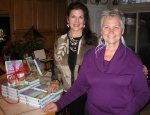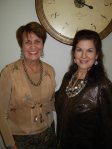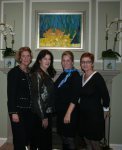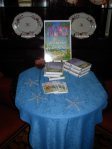Mara Purl's Blog, page 8
December 5, 2011
A Season of Possibility
 Over the course of this first December weekend, at an opulent gathering of friends, we went around the table answering the question, "what's the significance of Christmas to you?" We all acknowledged the spiritual import of the holiday, and because this was an international gathering, there was acknowledgment from widely divergent religious paradigms.
Over the course of this first December weekend, at an opulent gathering of friends, we went around the table answering the question, "what's the significance of Christmas to you?" We all acknowledged the spiritual import of the holiday, and because this was an international gathering, there was acknowledgment from widely divergent religious paradigms.
But we came back around the table again to touch upon that which we could only identify as the "spirit" of this time of year. For some, this is a time to focus more intently upon family and close friends, to offer the gifts of time and food, to open our homes, be they large or small, to experience something cozy and comforting, something timeless needing to be captured at least to the extent of celebrating it.
One person put it most succinctly by saying this is a time of Love. I have to use the capital letter here, because this is how she meant it: a huge, overflowing of good will, a true sense of caring, an increase of patience and a better space for listening, that which transcends emotion to become pure expression.
For me, this time of year is when the sense of possibility is most tangible. I would almost say possibility is so tangible as to feel magical—a feeling that what seems beyond reach might suddenly appear. That's how Christmas was for me in childhood—the sudden and magical appearance of Santa, who mysteriously knew what I wanted, and managed to bring it down the chimney just in time for the morning of December 25th, when my sister and I would race down the hallway in our pajamas to gasp at the spectacle of a tree that had appeared over night, with presents gleaming under its branches.
As an adult, I've heard some parents disapprove of Santa, saying he's little more than a fraud perpetrated on children who should in fact be told the truth. This may be true from a head perspective. Taken literally, this is a myth easily disproved. We could always go up to department store Santas and yank on their beards, or point out that not every house has a chimney.
But the heart knows better. It knows without having to be told that there are forces beyond logic at work in the universe, laws of harmony that supersede the apparent discords that tend to ensnare us. This is why I created Milford-Haven as the little town of infinite possibilities. When our footsteps are more sure, when our ears are attuned to raw possibility in its most infinite sense, then we remember what the heart knows—that with Spirit, all things are possible.
For more information on the changes that are taking place with The Milford Haven Novels, please read my newsletter. If you have not subscribed, visit www.MaraPurl.com to have my newsletter sent to your mailbox every month.








November 27, 2011
Thanksgiving Fully Present
 There are three things I love about Thanksgiving: the future, the past, and the present.
There are three things I love about Thanksgiving: the future, the past, and the present.
I think as a child I probably loved Thanksgiving because of the future—it meant Christmas was coming soon! It was also a holiday I anticipated with great joy because it meant we'd go visit Grandma Dorothy. She married my step-grandfather late in life—but just in time for my sister and me to adore her. The house she shared with "Daddy Bob" was a classic New England cottage in Waterbury, Connecticut. Cape-Cod-Blue with white trim, it stood erect despite the steep street that seemed to slice under it. My sister and I would go charging up the front steps to find two eagerly smiling grandparents opening the door to the enticing aromas of roasting turkey and baking pies. The furniture gleamed, the silver shone and the crystal sparkled, but never more brightly that Grandma Dorothy's smile. While we waited for dinner to be served, we'd escape to the attic, where there were dress-up clothes to play with and empty notebooks I used to fill with stories. After dinner she'd recite, "Pick I up and put me to bed, but don't bend I." It was the one day of the year I feared I might actually pop.
Later I came to love Thanksgiving because of the past. The oft-repeated stories of fore-parents and their Native hosts, of sharing food and creating a tradition to mark the beginning of our extraordinary country began to inspire and has never ceased. Even if parts of the tale are apocryphal; even if some take offense; the story contains the seeds of gratitude, multi-culturalism, creativity, shared wealth and so many other qualities that have born good fruit in the future those early people worked hard to imagine.
Now, I find Thanksgiving is possibly the most inspiring day of the year. The first thing that inspires me is that we actually have a day set aside for thanks, and each year I make my gratitude list. This year I have more than ever to be thankful for . . . and close to the top of my list I find you, my readers.
What else is special about this holiday? Instead of opening presents, we open doors to glimpse the lovely faces of family and friends, and have the special joy of their company. I attend a favorite church service, where the American President's annual proclamation is read, and where attendees share stories of gratitude and healing. Houses, not yet garish with the wonderful fun of Christmas, are resplendent with pumpkins and gourds, bright leaves and baskets of ripened vegetables. And so many kitchens—from estate kitchens to soup kitchens—are filled with the bustle and the aromas of the best meal of the year.
It's a day for reaching out to friends who can't be with family, a day for volunteering to serve food in shelters. It's a day for taking walks, kicking through rustling leaves or holding a coat closed against a brisk wind. It's a day for shutting down the computer and stepping away from our desks so we can flop on the couch and watch football, or cozy up for a good conversation over a cup of tea. It's a day for cherished traditions and shared recipes, bringing the basics—food and stories—to the people in our lives.
It's a day for using our heads—not for schedules and deadlines, but for deep reflection and real gratitude. And it's a day for using our hearts—not to outline what we want, but to listen to how and where we might serve. It's a day to unite head and heart so as to be able, from sheer gratitude, to find our cornucopia, to glimpse the infinite possibilities of the now, to be fully present.
For more information about my adventures, events and the Milford Haven Novels, please read my newsletter. If you have not subscribed, visit www.MaraPurl.com to have my newsletter sent to your mailbox every month.








November 21, 2011
Mile High Tea
 You've heard of "Pie in the Sky"—an idiom to convey that which is so unlikely that we shouldn't count on it, a kind of fool's gold, a dream only a Pollyanna would dare to dream.
You've heard of "Pie in the Sky"—an idiom to convey that which is so unlikely that we shouldn't count on it, a kind of fool's gold, a dream only a Pollyanna would dare to dream.
Well, if Pie-In-The-Sky describes what can't come true, perhaps "Mile High Tea" should be the new descriptor for what can. Why? Because anything Judith Briles touches actually does turn to gold. Judith was my hostess this past weekend for a gorgeous, elaborate and delightful tea at the lovely home where she and her husband, poet and editor John Maling, love to entertain.
So what do I mean by "gold"? When it comes to Dr. Judith Briles it means that which is practical and demonstrable. Her career began three decades ago when she was a stockbroker and one of the first female financial planners working with a national firm—laying the groundwork for the likes of Suze Orman. In fact, rather than continuing to work for someone else, she became an author and a speaker. Now, with twenty books to her name, and having delivered literally thousands of presentations focusing on strategies and solutions in personal and professional endeavors, Judith has success down to a science and an art.
Of course, it's obvious she's a "head" person. Her mind works so fast it's a challenge to keep up. Sometimes she's crunching numbers—something she seems to be able to do with her left hand while her right hand is making scones. Sometimes she's pondering a client's progress as she might a chess board, planning the next six moves in a career as steadily and deeply as a steeping pot of tea.
She's someone who's interested in breakthroughs—and in finding those who are ready to leap ahead. That's why she founded Author U, which offers dynamic monthly programs for serious authors. But even before she started her organization, she kept an ear to the ground for evolved authors while keeping an eye peeled for publishing opportunities. When it comes to locating these future business partners, she certainly uses her acumen and judgment— meaning she uses her head.
But why does she do all this? This is where the heart comes in. Because when it comes down to the bottom line, there's nothing in it for Judith. She doesn't ask for a percentage or even for a fee, unless one is a client. She brings people together for exciting new possibilities because she believes in good books well published; she understands the power of the word; and she passionately believes that a person fulfilling his or her calling in life is a person making an important contribution to the world. She feels that if a good thing can happen, it should.
That's why the tea Judith hosted for me wasn't just High Tea: it was Mile High Tea in the Mile High City. Yes, guests enjoyed delicious food from cucumber sandwiches to homemade sweets, along with several varieties of hot tea poured from a private tea pot collection. And yes, guests enjoyed the stories I shared, and bought lots of books before they headed home. But a lot more than good food and stories happened that afternoon. People got a glimpse of their own possibilities. That's what "in it" for Judith: the joy of inspiring others, and doing something special to instigate their success. She may have hosted this event for me because her head told her it would work. But the energy, resources and generosity that she expressed in giving me this gift—that came straight from the heart.
For more information about my adventures, events and the Milford Haven Novels, please read my newsletter. If you have not subscribed, visit www.MaraPurl.com to have my newsletter sent to your mailbox every month.








November 14, 2011
Whose Mystery: Our Characters' or Ours?
 "Who done it?" Why do we get so caught up in solving mysteries? I have several readers—whose names I shall not divulge—who regularly e-mail me demanding to know who killed Chris, and whether she's really dead, and when the crime will be solved! And I thought I was the only one who couldn't sleep at night wondering about the characters of Milford-Haven!
"Who done it?" Why do we get so caught up in solving mysteries? I have several readers—whose names I shall not divulge—who regularly e-mail me demanding to know who killed Chris, and whether she's really dead, and when the crime will be solved! And I thought I was the only one who couldn't sleep at night wondering about the characters of Milford-Haven!
My accomplished friend Margaret Coel has equally marvelous stories about the obsessive nature of readers and how involved they become with her characters. At our event last weekend, she recounted some of the "helpful suggestions" she receives regarding her two protagonists, and how their life-dilemmas might be solved. We loved hearing our audience laugh, and appreciated so much their warm reception. And it was a thrill to share the spotlight with Margaret, a writer I admire so much.
What are some of the key elements that make a mystery work? For both Margaret and me, it always starts with characters. In Margaret's Wind River Mysteries, Arapahoe lawyer Vicki Holden can never resist helping her people, nor can her friend Father John O'Malley. In my Milford-Haven Novels, I begin the series not with a sleuth, but with the strong, vibrant broadcast journalist Christine Christian.
During my recent blog tour, I had the honor of being hosted on the terrific blog The Lady Killers—run by a group of highly skilled women who specialize in mystery. If my guest shot was going to work, I had to come up with something challenging enough for this savvy group. So I went back to my character Chris. She's smart. How does she manage to get into such serious trouble? (To find out, read the Prologue of What the Heart Knows. . . .)
"When Smart Characters Do Stupid. Things" That was the title of my blog post. You know the kind of moment I'm talking about. It's when you want to shout out loud at the character, "Don't go over there!" You know she's about to do something stupid. How come she doesn't know? Well, this is what my character Chris taught me. She taught me that listening to her head wasn't enough to protect her. Because what was the one thing she failed to do? She failed to listen to her heart. Really? It's that simple? Well, let's say it's that profound. Listening to your heart—your instinct, your intuition—can not only keep you on track in life, it can actually save your life. True, this is a literary device. But it's also a metaphor. And that's what a good mystery is all about: the thrill of a difficult case and the satisfaction of solving it.
What keeps authors like Margaret and me returning book after book to the same characters? We're not the only writers to admit that sometimes it doesn't feel as though we're making these characters up; it feels more like we're taking dictation as they tell us what they're up to. Perhaps what's really going on is that with our research into history, place, and human nature, we've dug deep enough over the years to have found veins of gold. And every time we bring the ore to the surface, we get confirmation that we've found something of true value.
Interesting characters have issues—deep-seated fears; battle scars; unrecognized childhood imprints; thwarted dreams; delayed ambitions; and at least a few moments of glory. As we work through these issues in our characters, we're also working through them in ourselves. And though we use our heads to map our outlines and organize our chapters, the sudden insights that make a manuscript sing come from our hearts.
Indeed the gold in a character must be separated from the dross, and that happens in the initial sifting of rough drafts, and ultimately in the refining editorial fires. And it's not only the fictional characters who are thus improved. It's the author. Maybe that's the greatest mystery of all—that by giving ourselves to our art, our art gives us the keys that unlock our deepest mysteries.
For more information about my adventures, events and the Milford Haven Novels, please read my newsletter. If you have not subscribed, visit www.MaraPurl.com to have my newsletter sent to your mailbox every month.








November 7, 2011
When Women Gather
 "Girls Night Out"—the phrase conjures images of everything from innocent fun to naughty pleasures. But the realities of what women do when they get together might be even more interesting.
"Girls Night Out"—the phrase conjures images of everything from innocent fun to naughty pleasures. But the realities of what women do when they get together might be even more interesting.
Sometimes an evening with female colleagues is a rite of passage, a kind of test a woman can only pass by showing her authenticity. And sometimes a girlfriend-evening fulfills a basic need for time with those who share the same wiring.
Actually women have all kinds of ways of connecting. Sometimes the moments are brief—a quick lunch hour to catch up with a friend or get to know someone better. Other times it might be a special treat like afternoon tea—a chance to dress up and go someplace elegant, where the surroundings are inspiring enough to give us a fresh perspective.
Women have wonderful ways of marshaling resources to get things done. Whether in schools, corporations, or non-profits, some tireless committee members are at work even as we speak, coming up with creative fund-raising ideas, identifying societal needs and generally finding new ways to help others. In fact, there's no energy source to compare with a group of women united by a cause—like the members of the Lake Forest Woman's Club who hosted me last weekend. Continuing a tradition established by the founders of their club in 1902, they raise funds for scholarships and do it in style.
And yet what might be most impressive about women happens when we step aside from our default setting of doing-for-others, and actually let our hair down. Last year I finally decided to see what would happen if I invited a group of close women friends to join me for a long weekend in Cambria—the favorite California Coastal town upon which my fictitious town was originally based. I thought maybe two or three would be able to find time in their wildly busy schedules, but ultimately there were nine of us in a fabulous rental house where we cooked, shared meals and stories, exchanged gifts, and giggled like girls at a slumber party. We walked along the shore, hiked up into the Enchanted Forest that's in my novels, trolled up and down the Main Street shops, then returned home to soak in the hot tub and watch the sun sink into the Pacific as the lighthouse flashed its beam across the water. For me, four of the women were life-long friends; all were friends of several years' duration. But some of them had never met. I wondered how that felt for them, and saw special connections being forged.
This past weekend, I found out first-hand what it's like to share special time with newer women friends. The trip began as a professional engagement. And being the guest speaker for this club's superb book event was an honor. But somehow the trip became something more. A generous woman I'd never met invited me to be her house guest, and our mutual friend arrived from another city to be her guest as well, bringing with her another friend. Suddenly there were four women staying in a beautiful home. We fell into step as though we'd known each other for years. When we returned from a trip to the grocery store, we noticed we'd been tracking what the others might want. My favorite latte showed up just as I unpacked another gal's favorite yogurt. Having enjoyed some elegant events and swanky meals out and about, we chose to spend our last evening together munching snacks in our jammies.
So what happens at these gatherings? We shared funny stories. And we also talked about life purpose and core mission, and how to figure out when we're on track. What do we get from these gatherings? A confirmation that intuition is smart in its own way; a sense of belonging; a certainty of being understood.
How are women able to cross the threshold from formal to familiar? From the perspective of the head, it didn't make a lot of sense to fly off to an unfamiliar city and stay with a stranger. But from the perspective of the heart, there was the possibility of synchronicity and synergy, connection and confirmation, acceptance and friendship. That's what happens when women gather.
For more information about my adventures, events and the Milford Haven Novels, please read my newsletter. If you have not subscribed, visit www.MaraPurl.com to have my newsletter sent to your mailbox every month.








November 1, 2011
Fiction: Tricks or Treats?
 Perhaps cracking the cover on an unknown book is something like opening the door to strange children on Halloween. "Trick or Treat" they cry. We consider it mostly an idle threat, because we know if we've opened the door at all, we're going to deliver a treat, and therefore not expect to be tricked. And perhaps this is analogous to shelling out our twenty-five dollars for a hardcover book: we expect to receive a treat and we don't expect to be tricked.
Perhaps cracking the cover on an unknown book is something like opening the door to strange children on Halloween. "Trick or Treat" they cry. We consider it mostly an idle threat, because we know if we've opened the door at all, we're going to deliver a treat, and therefore not expect to be tricked. And perhaps this is analogous to shelling out our twenty-five dollars for a hardcover book: we expect to receive a treat and we don't expect to be tricked.
But what's the point of fiction? Is it to trick the reader into thinking that the characters they're reading about and the circumstances in which they find themselves are real? (Oh, that reminds me of a pet peeve. Someone recently called a non-fiction book a "real" book, as distinct from novels, which she apparently considers to be "unreal.") No, I'd say we're all much too savvy to believe that the fictional situations we read in novels are actually taking place just as described.
Yet there are those who employ "writing tricks" hoping to pique readers' interests or keep them coming back for more. You know the kind of tricks I'm talking about, like when a character does something he/she just wouldn't do, but it's page 223, and it's time for something exciting to happen, so suddenly a man with a gun shows up at the door, or the phone rings and it's a long-lost relative who's running away from a stalker and needs to stay for a while. It's not as though odd things don't happen in life; they do. But what makes intersecting plot lines truthful—and truly interesting—is when we, the reader, get to see these plot lines aiming across the universe, sometimes long before the characters do. Writers who employ short cuts, Deus Ex Machina, and other tricks may believe readers aren't smart enough to avoid being tricked. But on the contrary, I find readers to be smart about stories. Even if they can't tell you why, they know a "true" one when they read it.
So, if good fiction doesn't trick, does it, instead, deliver a treat—a too-sweet confection that allows us to slip the usual bounds of daily life and experience a heightened sense of possibility? And if so, is this "treat" just a sugar-high from which we will shortly crash as we put down the book and reenter the regular course of our real lives?
Well, yes, that can happen. Some books might indeed offer a kind of sugar-coated version of reality that leaves us distracted, but not informed; jacked-up but not truly fed. This style of fiction is fun occasionally, but to be avoided on a regular basis. We wouldn't want a steady diet of this kind of reading any more than we'd want to try to subsist on candy bars and ice-cream, no matter how appealing this might sound. The aftertaste of both these "tricks" and "treats" is nasty, and may even drive a reader away from all kinds of fiction. But this would be a sad mistake. Why? Because fiction can offer real treats that no other form of writing, or of entertainment, can.
So what would a "real" novel offer? It would feed the soul as substantially as great meal does the body. It would expand the sense of possibility as startlingly and essentially as a Yoga class stretches the body. And it would offer a heightened perspective as naturally as a window seat on transcontinental flight. That's the kind of treat I'm talking about, one that shows you how novel life can be.
For more information on the changes that are taking place with The Milford Haven Novels, please read my newsletter. If you have not subscribed, visit www.MaraPurl.com to have my newsletter sent to your mailbox every month.








October 24, 2011
Serendipi-Tea
 A few years ago, when I was first searching for the right kind of special event for readers of my Women's Fiction novels, I chose Afternoon Tea as the perfect thing. "Tea" seemed to signify both elegance and comfort, a chance to connect with others while taking a break from hectic schedules. And though men sometimes attend, the event itself has a feminine quality, with great attention to detail and style.
A few years ago, when I was first searching for the right kind of special event for readers of my Women's Fiction novels, I chose Afternoon Tea as the perfect thing. "Tea" seemed to signify both elegance and comfort, a chance to connect with others while taking a break from hectic schedules. And though men sometimes attend, the event itself has a feminine quality, with great attention to detail and style.
The first person I approached with this idea was my mother. A brilliant hostess, she grasped the concept instantly and offered her own home for a series of three events that I named Hospitali-Teas. And I added one more component that's so important to me, my readers, and all my women friends: donations to worthy causes. So at each tea, I donate a percentage of sales to a non-profit dear to my heart or close to the event, or both. Thus were born the Possibili-Teas, Generosi-Teas, Creativi-Teas, and the list continues. This year I launched the Milford-Haven Socie-Tea. Next February, I'll be doing the first "Uni-Tea" with the wonderful Unity Shoppe non-profit in Santa Barbara. So when it comes to Tea, I'm on a roll . . . or should I say, a scone.
On tour for my brand new novel these days, I was heading to Phoenix where I'd come to the attention of Jeffrey Hattrick "The Tea Guy"—the director of High Tea at the Ritz-Carlton, who has created not only the position of Tea Sommelier, but also Jeffreys Tea, a company offering his own unique tea blends, one for each season. For the Ritz-Carlton, he designed a tea menu where each delectable, be it savory or sweet, is actually infused with tea.
The moment my guests and I sank into the plush seats in the Tea Lobby, the sense of urgency and schedules and to-do lists began to evaporate like a wisp of steam escaping from the porcelain teacups that were soon set before us on knee-high marble tables. Signing books between sips, I sat back to enjoy the surroundings, and was then delighted at being serenaded by Jeffrey and his pianist—another special part of tea at the Ritz-Carlton.
After my first cup of Earl Gray, my eye was drawn to the mirror-image seating area across from the one where I sat with Dianemarie and Doug Collins. Noticing a copy of my book sat on their table, I walked toward them and asked if I might bother them for a moment. "Oh, you're not bothering us at all!" An elegant woman about my mother's age spoke in a lilting South African cadence. Myrna was visiting her beautiful daughter Ava, who lives in Scottsdale. Ava had decided to create a tradition: taking her mother out to tea on a regular basis. I couldn't help but think of my own mother, and how much she'd love that idea.
Why do we need to create occasions just to be able to have a conversation with someone as important to us as a mother or a daughter? Because otherwise, life with its urgencies and schedules and to-do lists sweeps us along. Before we know it, the conversations we always thought we'd get around to—the big ones where the daughter asks why did you marry dad? Was it hard to give up your career? Did you always want to have children? Or the small ones like should I keep dying my hair? Should I renew my Costo membership? Can I cook the turkey this year?—those conversations just never happen. Snatches of them do, before the cell phone cuts out or the doorbell rings. But the sitting together, the deep breaths, the warming sips—these don't happen unless we create the space in which they can.
There's one more thread to this tea story. Ava had tried to schedule tea for herself and her mom elsewhere, and it hadn't worked out. She'd also heard about an author (yours truly) whose new book What the Heart Knows sounded like something she wanted to give her mother as a birthday gift. Stopping by the local Barnes & Noble, she'd been told the book was due to arrive in a couple of days. Now Ava had two disappointments: no tea, and no book. But though her head told her things weren't working, since it was her mother's birthday, her heart wouldn't let her give up, so she tried again. Turned out, tea was being served at the Ritz-Carlton, so she made her reservation. Imagine Ava's utter amazement at what she saw as she and her mother were seated in the Tea Lobby. Not only was the book she'd been looking for on display; the author was now sitting at their table! By listening to her heart, she was led right to her heart's desire. That's what I call a Serendipi-Tea.
For more information on the unfolding world of The Milford Haven Novels, please read my newsletter. If you have not subscribed, visit www.MaraPurl.com to have my newsletter sent to your mailbox every month.











